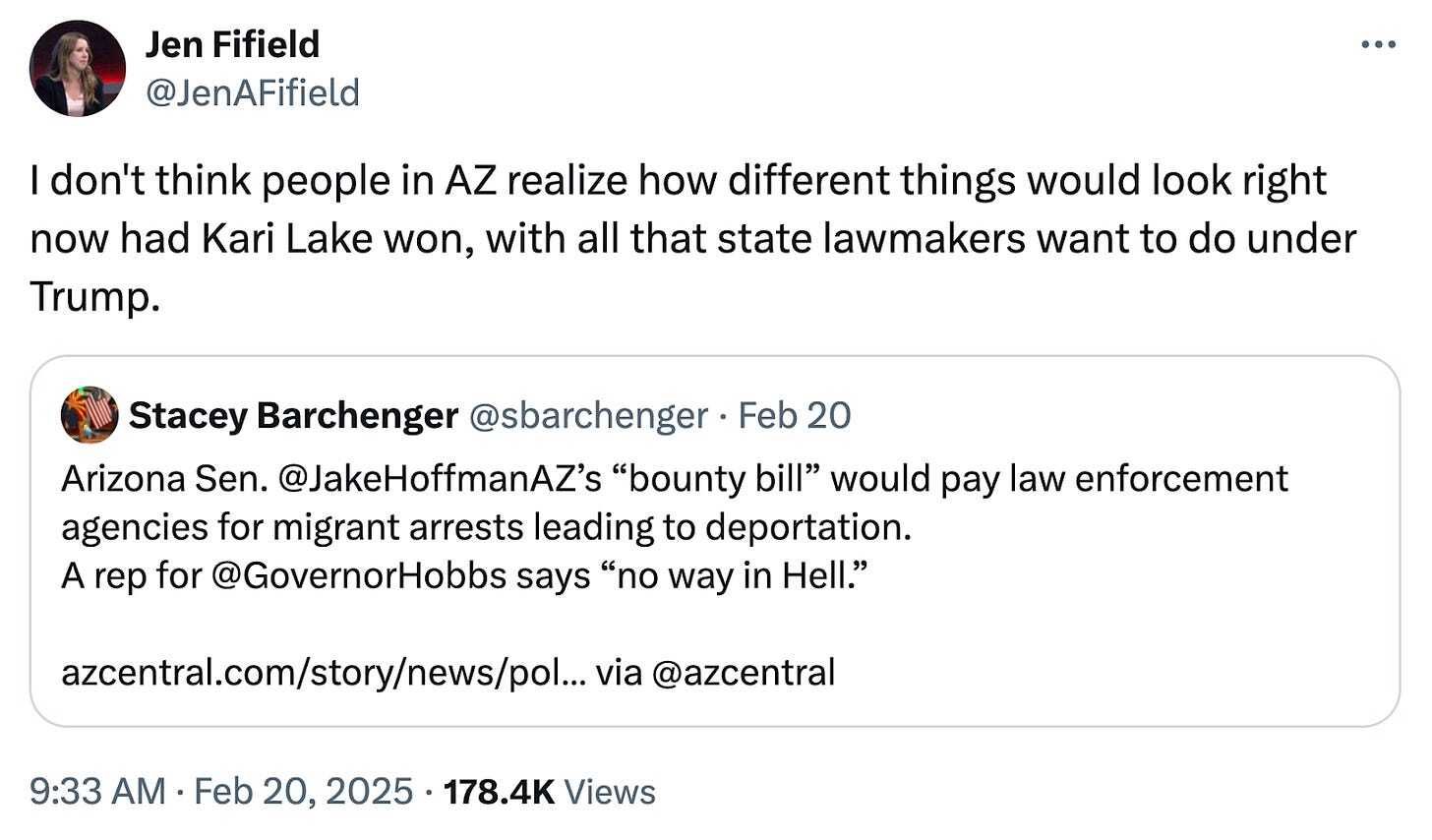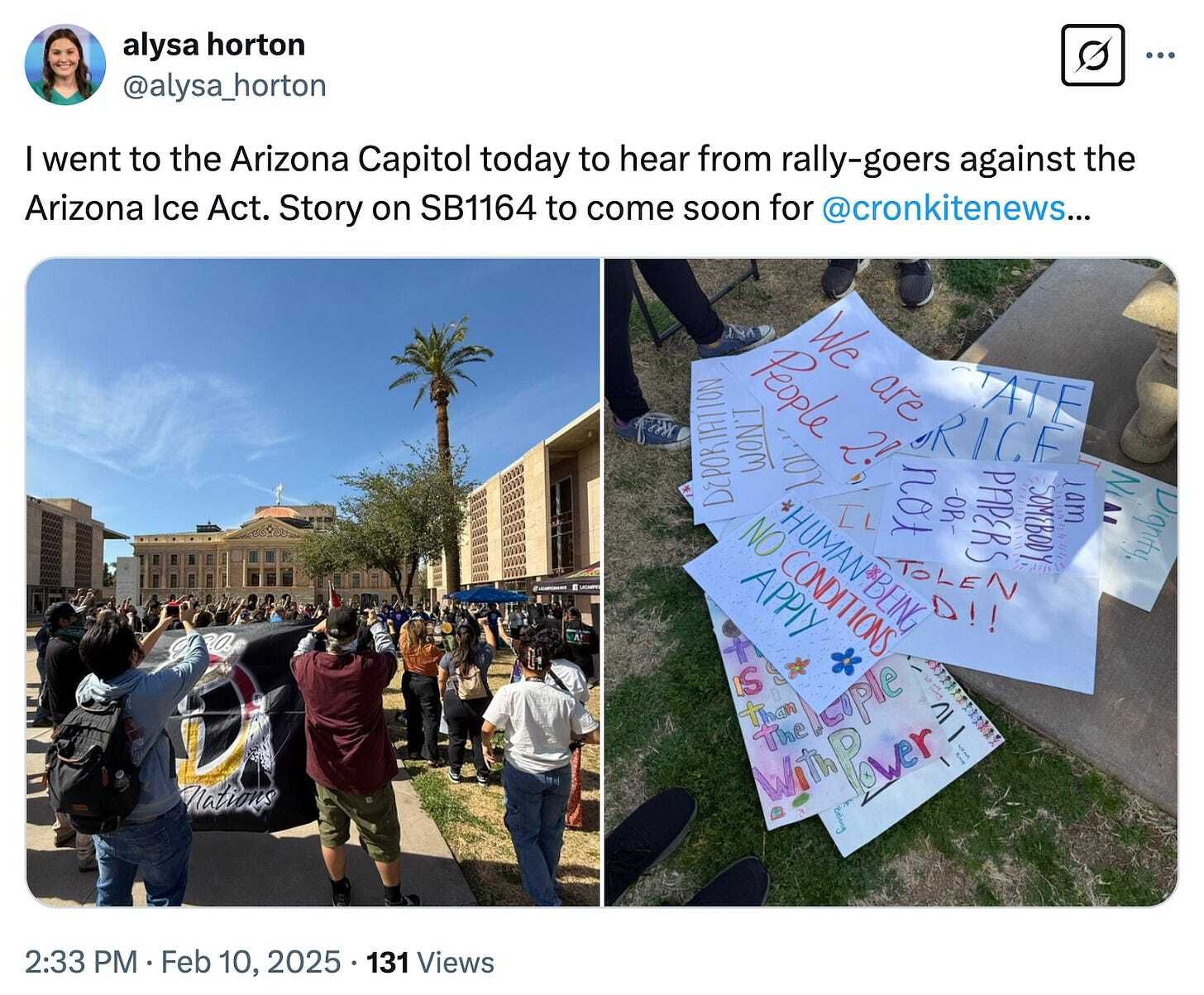Only a handful of border-related bills made it through the first wave of winnowing at the Legislature.
But they would pack quite a wallop if they become law.
Democratic Gov. Katie Hobbs has already told lawmakers that many of their hardline policies are dead on arrival at her desk.
With that in mind, Republican lawmakers have little incentive to wrestle with whether border bills from their fellow Republicans are actually good policy. Many of the bills flying through the Capitol are designed to get vetoed just to make a statement.
But Hobbs has her own statements to make.
She has been trying to burnish her border credentials lately as she heads into her reelection, including by issuing an executive order last week directing state departments to partner with local and federal law enforcement to expand border security. She called it Operation Desert Guardian.
We wouldn’t be surprised to see her sign some of the more moderate bills, especially anything bolstering border security funding.

And there’s always the possibility Republican lawmakers will try to get around Hobbs by referring measures directly to voters. They pulled that off last November with Prop 314, when a wide margin of Arizona voters gave local law enforcement more authority to arrest people on immigration-related charges.
So today, we’re rounding up the border and immigration-related bills you should be paying attention to.
Getting on Team Trump
Several of the bills moving at the Capitol would tether local and state authorities to whatever the Trump administration decides to do.
Republican Rep. Teresa Martinez wants to ensure Hobbs and Attorney General Kris Mayes are in lockstep with the president.
Her House Bill 2099 would require the governor and attorney general to enforce federal actions and orders related to immigration laws. Many of its provisions would expire on January 19, 2029, the day before the next president after Trump takes office.
The House passed the bill on a party-line vote and it’s now in the Senate.
Republican Sen. Jake Hoffman has a similar idea. He’s aiming to ensure compliance with the Trump administration at the local level. His Senate Bill 1088 would require state and local officials, as well as government contractors, to comply with federal immigration laws. They would have to cooperate with federal agencies like U.S. Immigration and Customs Enforcement as they investigate. Many of the bill’s provisions would expire on December 31, 2028.

Republican Rep. Quang Nguyen’s bill is a little different. It’s reminiscent of what border hawks did before Trump came on the scene.
Nguyen wants to appropriate $50 million for the Department of Public Safety to provide local border support, like funding local law enforcement positions for drug interdiction and grants for prosecuting and detaining people for border-related crimes.
His HB2606 is still moving through the House. It got a little bipartisan support, thanks to Democratic Rep. Kevin Volk, who supported it.
But even if the bill becomes law, the courts might have something to say about it.
The $50 million would fund law enforcement activities that were set up by Prop 314, the ballot measure voters approved in November. But the state constitution says that if ballot measures require funding, then that funding has to be included in the measure itself. And the money can’t come from the state’s General Fund, which is what Nguyen’s bill would do.
More border funding isn’t the only bipartisan border bill at the Capitol. The Democratic attorney general has teamed up with Republican Rep. David Marshall on a bill allowing police to shoot down drones near the border. HB2733 passed the House with bipartisan support yesterday.
Getting under their skin
A few of the bills are making immigrant rights advocates howl.
Hoffman wants to put a bounty on immigrants. Under his SB1111, financial institutions would charge a fee on international wire transfers, a common way for immigrants to send money to their families back home. That money would go into a “Deportation Fund” and state officials would offer grants of $2,500 to local law enforcement agencies that apprehend an immigrant who is eventually deported.
Lawmakers in Missouri and Mississippi considered similar bills this year, with a different twist. They would have offered bounties to bail bondsmen and other civilians, rather than police departments. The original version of the Arizona bill would have offered the bounty directly to the officers who made the arrest.
The Senate Government Committee approved it on a party-line vote, but it’s still awaiting a vote from the full Senate.

Senate President Warren Petersen wants to allow law enforcement agencies to enter into agreements with federal immigration agencies to enforce federal immigration laws, including holding people at local jails who are under detainers from federal officials.
The original version of the bill, SB1164, would have required law enforcement agencies to enter into those agreements, instead of just making it an option.
One part of the bill, also known as the Arizona ICE Act, is riling up local officials and school board members. It would forbid them from adopting policies that restrict cooperation with federal immigration agencies.
Hobbs’ spokesman Christian Slater told the Republic that the governor wants to work with federal agencies on the border, but she doesn’t want to “tie the hands of law enforcement and allow Washington, D.C. to set policies for Arizona.”
The Senate passed the bill on a party-line vote and it’s now headed to the House.

Republican Sen. Wendy Rogers wants to track how undocumented immigrants use hospitals. Her SB1268 would require hospitals that get payments from the Arizona Health Care Cost Containment System to ask patients about their citizenship status. Hospitals would submit quarterly reports showing the number of undocumented immigrants they treated and the uncompensated costs related to caring for them.
It’s similar to an executive order issued by Texas Gov. Greg Abbott last year that mandates hospitals track the cost of treating undocumented immigrants.
The Arizona Senate passed the bill on a party-line vote and it’s headed to the House.
The ones that didn’t make it
Democratic Sen. Analise Ortiz proposed a bill that would have directly contradicted the bills sponsored by Petersen, Hoffman, and Martinez. Ortiz wanted to prohibit local and state law enforcement from enforcing federal civil immigration laws. The bill never got a hearing.
Democratic Rep. Mariana Sandoval wanted to make a change in the terminology used in statutes, changing “alien” to “immigrant” or “undocumented immigrant.” Democratic Sen. Catherine Miranda introduced a similar bill in the Senate. Neither got a hearing.
Sandoval also made the perennial effort to repeal SB1070, while Ortiz tried to do the same in the Senate.
Democratic Rep. Aaron Marquez wanted to expand eligibility for in-state tuition at public universities and community colleges to include residents without legal immigration status who are attending public or private high schools in Arizona. But Republicans didn’t like that idea either.
It wasn’t just Democrats who saw their border-related bills die.
Republican Rep. Alexander Kolodin wanted to give landowners a tax credit if they allowed the federal government to use their land to build a border wall. But that bill, HB2053, didn’t go anywhere.

Fight or flight: Democratic Gov. Katie Hobbs and Democratic Attorney General Kris Mayes have adopted vastly different stances and strategies when it comes to dealing with President Donald Trump — which is partly reflective of their personalities, and partly reflective of the dual mindsets of Democrats across the country who are struggling to decide whether to fight him at every turn or pick their battles, the Republic’s Stacey Barchenger reports. It also reflects their positions in government — attorneys general are better suited to fight Trump’s agenda, while the governor is responsible for implementing programs that rely on federal funding.
“Hobbs pledged to work with Trump but stand up to him, too,” Barchenger writes.
Tax cut talk: Republican lawmakers are pushing for more tax cuts, on top of the largest tax cut in Arizona history four years ago, Capitol Media Services’ Bob Christie reports. The deficit, which was caused partly by the last tax cut, is gone. The Senate passed a bill last week that would automatically cut income tax rates when the state has a surplus. But Hobbs says she’s “not interested in tying our hands like that.”
Ranchers and scammers: The LA Times visited fourth-generation Arizona border rancher John Ladd, who is pretty stoked about Donald Trump’s election, saying he literally sleeps better at night now that the cross-border trafficking near his house has died down considerably. He says whereas many as 700 people per day crossed into the U.S., now it’s only about a dozen or so. But he still doesn’t think much of politicians.
“It’s a scam,” Ladd said, differentiating between what politicians say and what they do. “Republicans want cheap labor. Democrats want cheap votes. Americans want cheap tomatoes.”
Road rage: Navajo County Recorder Timothy Jordan, who was indicted last month on criminal charges tied to a road rage incident about two weeks before the November 5 election, tells Votebeat’s Jen Fifield that he was scared for his life. Jordan pulled out a gun during the incident, which took place near his child’s school. He went on to beat a Democratic incumbent in November, but if he’s convicted of a felony charge of disorderly conduct with a weapon, he won’t legally be allowed to hold office.
Dollars rolling in: A big chunk of the $100 billion that the Taiwan Semiconductor Manufacturing Co. (TSMC) is planning to invest in the United States will head to Arizona, KTAR’s Kevin Stone reports. The company already put $65 billion toward three factories in Phoenix. In other big investment news, the Mayo Clinic is planning to invest $1.9 billion in an expansion of its campus in north Phoenix, Axios’ Jessica Boehm reports.

Looking back: An architect of the Groundwater Management Act looks back 45 years later, the Capitol Times’ Reagan Priest reports. And Axios’ Jeremy Duda traces the transformation of Buckeye from a sleepy farming town decades ago to a fast-growing city.
It’s already bad: Indigenous organizers warned U.S. lawmakers that federal funding cuts could hinder access to vital services like infrastructure, health care and law enforcement, per the Arizona Mirror’s Shondiin Silversmith. More than 60 tribal leaders spoke to a U.S. House of Representatives Appropriations subcommittee, including Navajo Nation President Buu Nygren, who said people are waiting 45 minutes for ambulances amid years of inadequate federal funding. San Carlos Apache Chairman Terry Rambler said his region’s police department needs 75 officers to be fully staffed, but only has 19.

This is actually not a laugh. It’s a pitch for you to upgrade to a paid subscription today.
Two-time election denier and fake governor/senator Kari Lake got a gig at the United States Agency of Global Media, which oversees Voice of America.
And if that doesn’t scare you into paying $10 per month to support real, local independent journalism, nothing will.


